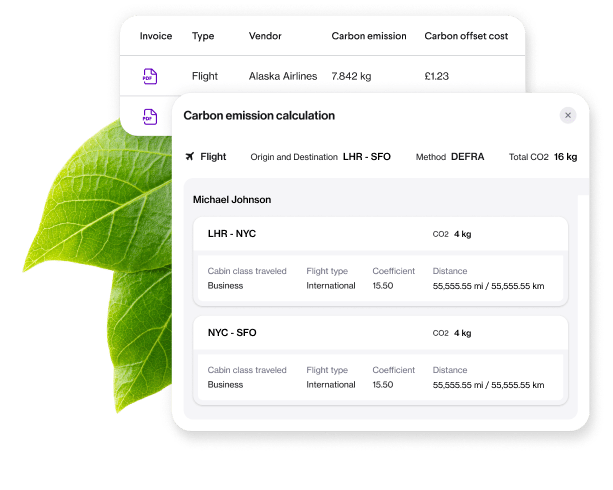What Is Sustainable Travel and Why Does It Matter for Companies?

Samantha Shankman

As the impact of climate change has become more pressing, the concept of sustainable travel and sustainable tourism has gained significant traction. Sustainable travel, of course, involves making choices that not only minimize adverse effects on the environment, economy, and society but that also contribute to the preservation of our planet.
Sustainable tourism extends this concept to the tourism industry, by focusing on responsible travel practices that promote environmental stewardship, cultural sensitivity, and economic benefits for local communities.
But what does sustainable travel mean for various roles within a company? Here’s a breakdown.
What Sustainable Travel Means for Travel Managers
For corporate travel managers, sustainable travel is about integrating environmentally responsible practices into corporate travel policies. This includes selecting travel options that reduce carbon emissions, such as choosing airlines with more fuel-efficient fleets or opting for rail travel over short flights.
Implementing a comprehensive tracking system to monitor travel-related emissions is also crucial. Travel managers can influence corporate travel decisions by prioritizing direct flights, promoting the use of public transportation, and encouraging virtual meetings to minimize travel needs.
What Sustainable Travel Means for Sustainability Managers
Sustainability managers play a pivotal role in driving a company’s environmental goals. For them, sustainable travel is a critical component of a broader sustainability strategy that involves measuring and managing the carbon footprint of business travel, investing in carbon offset programs, and adopting sustainable aviation fuels.
Sustainability managers must ensure that travel policies align with corporate sustainability targets and regulatory requirements, such as European Corporate Sustainability Reporting Directive (CSRD) regulations and U.S. Securities and Exchange Commission (SEC) climate-related disclosure rules. They also work on educating employees about the importance of sustainable travel practices and the effects of their travel choices.
“The sustainability tools and features were an attractive benefit in Lime’s decision to partner with Navan as its corporate travel solution.” - Andrew Savage, VP, Head of Sustainability
Learn how Navan helps Lime on the road to net-zero emissions here.
What Sustainable Travel Means for Business Travelers
For business travelers, embracing sustainable travel means understanding the effects of their choices on the environment. By making informed decisions that align with environmental goals — such as selecting flights with lower emissions, using public transportation, and considering alternative modes of travel — they become integral parts of their company’s sustainability efforts. Their mindful travel choices can help reduce their carbon footprint and contribute to a collective effort toward sustainable travel.
The Factors Driving Increased Awareness Around Sustainable Travel
In recent years, there has been a growing awareness among companies and travelers regarding the importance of sustainability. Several factors are driving this shift:
- Regulatory Pressure: Governments worldwide are implementing stricter regulations requiring companies to report and reduce carbon emissions. These include regulations like the CSRD in Europe and the SEC climate-related disclosure rules in the U.S., which push companies to adopt more sustainable practices.
- Consumer and Investor Demand: Consumers and investors increasingly demand greater corporate transparency and accountability. Companies committed to sustainability enhance their reputation and market position, making them the favorites of customers and investors.
- Corporate Social Responsibility (CSR): Many companies integrate sustainability into their CSR initiatives. Aligning business practices with environmental stewardship helps build a positive corporate image and foster stakeholder trust.
- Cost Savings: Sustainable travel can lead to significant cost savings. Companies can reduce travel expenses and operational costs by optimizing travel routes, choosing fuel-efficient flights, and encouraging virtual meetings.
- Employee Engagement: As employees become more environmentally conscious, they tend to prefer working for companies that prioritize sustainability. Promoting sustainable travel can enhance employee morale and engagement and help with recruiting new talent.
- Climate Change Awareness: The increasing urgency of climate change has heightened awareness about the environmental impact of business travel. Both companies and individuals recognize the need to reduce their carbon footprints to mitigate the adverse effects of climate change.
By understanding these drivers, companies and travelers can make more informed decisions that contribute to global sustainability efforts.
The Importance of Sustainable Travel in the Context of Climate Change
Sustainable travel is not just a trend; it’s a necessity in the fight against climate change. The travel industry significantly contributes to global greenhouse gas emissions, mainly from air travel.
Companies can play a crucial role in reducing their environmental impact by adopting sustainable travel practices. This helps mitigate climate change and aligns with the growing regulatory requirements, such as the CSRD in Europe, the SEC climate-related disclosure rules in the U.S., and societal expectations for corporate responsibility.
By embracing sustainable travel, companies can lead by example and drive positive change in the travel industry. This leadership role empowers companies to pave the way for a more sustainable future, where responsible travel practices are the norm rather than the exception.
How Companies Can Track, Measure, and Move Toward Sustainable Travel
- Implement a Comprehensive Tracking System: Leverage advanced software solutions that integrate with travel booking platforms to track and measure air travel emissions accurately. Real-time data on emissions per flight helps in making informed decisions.
- Adopt Third-Party Emission Factors: Use emission factor sets from recognized authorities like DEFRA, ICAO, and TREMOD to ensure accuracy and consistency in carbon calculations.

Above: Navan shows the environmental impact of travel bookings in three globally recognized carbon calculating methodologies to ensure data congruence.
- Promote Sustainable Travel Policies: Encourage employees to choose flights with lower emissions and consider alternatives such as rail travel for shorter distances. Implement policies that prioritize direct flights and fuel-efficient airlines.
- Leverage Real-Time CO2 Dashboards: Provide stakeholders access to dashboards that offer granular insights into emissions by passenger, department, flight route, and date. This transparency helps identify critical areas for improvement.
- Integrate Emission Data into Flight Booking: Embed emissions information into the flight selection process so travelers can see the environmental impact of their choices, which may lead to more informed and sustainable decisions.

Above: On Navan, travelers can see the carbon emissions associated with each flight option. These tangible examples of environmental impact drive informed choices.
- Encourage the Use of Sustainable Aviation Fuels: Partner with airlines and suppliers offering sustainable aviation fuels (SAF), which help reduce air travel’s carbon footprint.
- Offset Unavoidable Emissions: Invest in high-quality carbon offset programs to compensate for unavoidable emissions. Ensure these offsets are certified and contribute to meaningful environmental projects.
- Monitor and Report Progress: Set targets for reducing air travel emissions and track progress against these goals. Transparency in reporting enhances credibility and accountability.
“The Rail Alternative Pop-up, especially among our European colleagues, is the most influential feature that’s helped us shift employee awareness around sustainability. It is a concrete tool and prompt within our platform that we ensure employees are aware of.” - Andrew Savage, VP, Head of Sustainability
Learn how Navan helps Lime on the road to net-zero emissions.
The Future of Sustainable Travel
As awareness grows around climate change and other environmental issues, sustainability will become increasingly important to businesses and individuals. Companies will continue to innovate and develop new technologies and practices that make sustainable travel more accessible and practical. Business travelers will be more conscious of their travel choices, understanding the broader impact of their decisions on the environment.
With companies integrating robust sustainability measures into their travel policies and operations, sustainable travel will likely become the standard. This shift will not only help mitigate the impacts of climate change but also foster a culture of responsibility and stewardship within the corporate world.
By embracing sustainable travel now, businesses and individuals can pave the way for a more sustainable and resilient future and help to protect our planet for future generations. Sustainable travel is a crucial step in the global effort to combat climate change, and its importance will only continue to grow as we move forward.
Learn more about Navan’s sustainability suite of tools today.
This content is for informational purposes only. It doesn't necessarily reflect the views of Navan and should not be construed as legal, tax, benefits, financial, accounting, or other advice. If you need specific advice for your business, please consult with an expert, as rules and regulations change regularly.